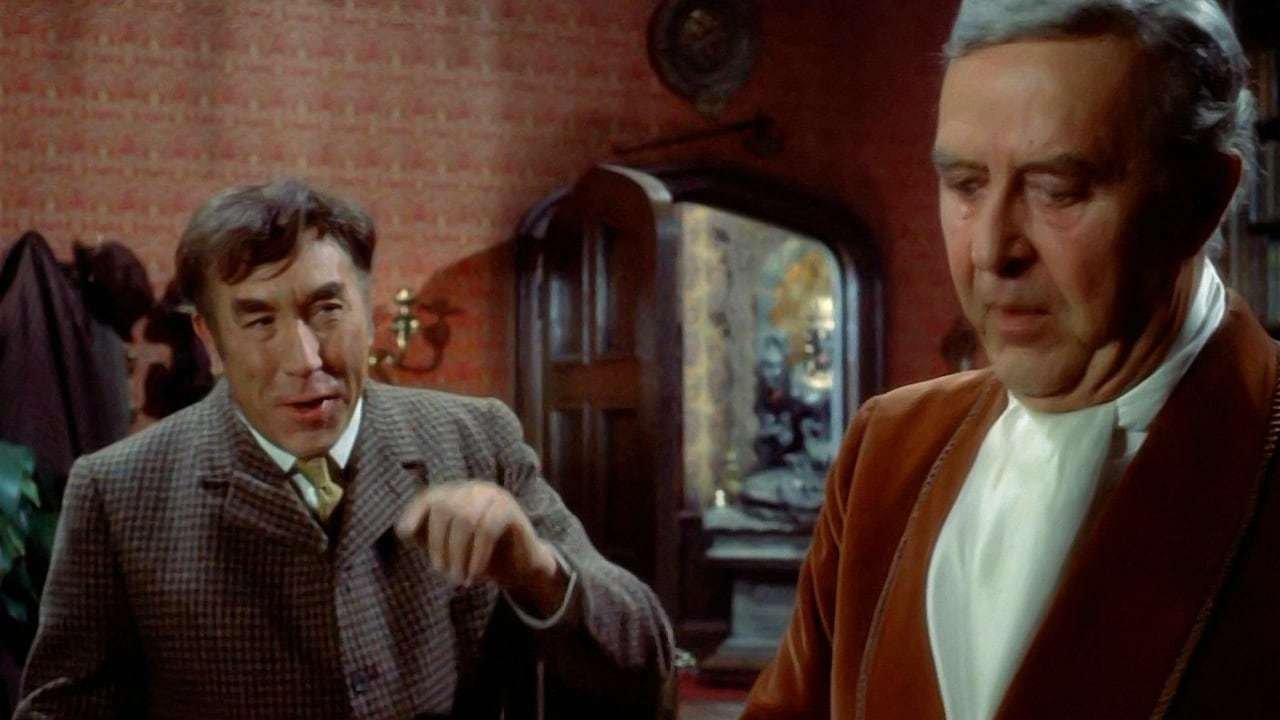
The House In Nightmare Park (1971)
“Yoo-hoo! I’m here… the entertainment’s arrived! I’ve played empty houses before, but blimey…”
Ah, the wonderful roll call of names from British horror films through the ages… who can forget such characters as Matthew Hopkins, Lorrimer Van Helsing, Foster Twelvetrees or Anton Phibes? Hang on… Foster 'oo?
Why, Foster Twelvetrees, of course… the Greatest Master Of The Spoken Word, perennial showman, titan of the toupee, heir to a fortune and (let's not forget) an out-and-out "swine". Few who attended his one-man stage show of "Oliver Twist" stayed until the end, and those who did caused grave damage to the posters outside. But when it comes to blithely wandering into danger or failing to get the message that all's not what it seems, Foster's our man.
What's all this about? You may well ask. Well I'll tell you. Oo, no, stoppit (or is that Kenneth Williams?). Anyway, ooh. Please yerselves. No, missus etc.
When we first meet our hero (Frankie Howerd, in case you hadn't guessed), he's been employed to give one of his world famous orations for a private party at a remote house. Dropped by the coachman half a mile from his destination ("I hope your wick shrivels! Bodkin…"), he walks towards a lightning-lit Gothic monstrosity. Inside, all is quiet. Quiet, that is, until Foster arrives. "Yoo-hoo! I'm here… the entertainment's arrived! I've played empty houses before, but blimey…"
The place is like the Marie Celeste. The only noise to be heard is a gramophone spinning at the end of the record (until Foster breaks it, that is). Suddenly he hears a scream, and with the courage aplenty he mutters "Oh they can stuff their five guineas, I'm off!"
But before our man has the chance to scarper, his hosts, the Henderson family, appear. Repatriated British ex pats, they've returned to the family pile from India, bringing native servants and Hinduism with them (like so many before them, see The Ghoul). They seem remarkably unimpressed with their visitor and send him straight off to bed, where he unpacks a load of photos of himself ("Not bad for 32…"), and wanders into a strange room whilst looking for the privy. A figure covered with a blanket is briefly seen. Who can it be?
And... what can be going on? Well, it doesn't really matter, because this film may well have a plot (yes, it's the old "family out to inherit a fortune" routine again, folks), but it's really only a platform for Howerd's considerable comic talents.
Whether he's having a saucy dream ("Oh don't, Melanie…" (hears knocking) "Melanie, it's the knockers! I'm saving myself for Miss Right!" (wakes) "They won't let you enjoy anything in this house. Another couple of minutes, I might have cheapened myself…") or chatting to the lady of the house about her "pets" ("Look at their little noses twitching, wonderful sense of smell, you know. I could smell them before I came round the corner… Look at them, what a lovely pair. May I stroke them? I meant the rabbits! Ooh, I've offended her. Now she's taken umbridge."), Howerd is on Carry On - topping top form.
But he's not the only one, this film is packed to the gunnels with character actors who spark off Howerd's brilliance, particularly Hugh Burden as Reggie, the brother who takes an immediate dislike to Twelvetrees, wasting no opportunity to call him a "swine" (and believe me, it gets funnier every time he says it). Their first meeting, when Howerd wanders into breakfast in typical style to be greeted by a terse "Who is this oaf?" is priceless, as is their later exchange: "Damn moron!" / "Now watch it, mate!" / "The man's a cretin!" / "That's better…"
You might have guessed, I thoroughly enjoyed this film. No opportunity to slip in a one-liner is wasted, and pretty much every single one has some relevance to the script.
Foster gets attacked with a meat cleaver and tells his saviour: "If you hadn't come in, it would have been Sixtrees!"
Foster gets offered some wine: "It's a bit dry for my taste. I prefer it a bit… wetter."
One of the sisters, Verity, sees a face at the window as Foster commences his latest oration. She faints and Reggie bursts in to see Foster trying to resuscitate her: "I was just giving her my Little Nell!" / "Filthy swine!"
Foster brags about his musical expertise to Verity: "Do I play the piano? Does Paganini play the trumpet?" / "Do you play by ear?" / "No, I'm going to use my fingers."
The film could be a straightforward comedy thriller, if it wasn't for some suitably nightmarish touches and a few grisly deaths which elevate it to Gothic horror territory. At one point the entire family dress up as living mannequins for Foster's benefit, which is frankly bizarre (until you've seen respected horror stalwart Ray Milland do this, you've not seen Ray Milland). Later Foster goes for help in a deerstalker and cape through the fog shrouded moors, which brings to mind Hammer's 60s Gothics. Deaths include scythings, cleaver-ings and snake attacks, and there's even a cringe-inducing mad dentist scene. Tack onto that a great double-twist ending and a striking final image, and The House In Nightmare Park becomes much more than the sum of its parts. Very funny, very Hammer (not surprising when you find out it was directed by Peter “Demons Of The Mind” Sykes), and very, very good. Who says there's only ever been one successful Hammer-alike horror comedy ever produced? Carry On Screaming, you've got competition, and we never even knew it…
